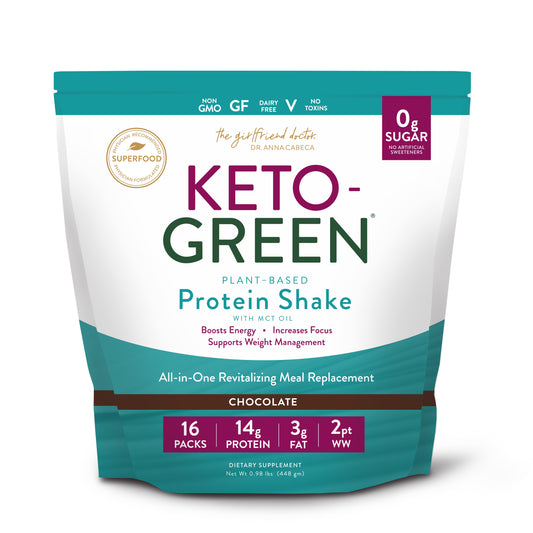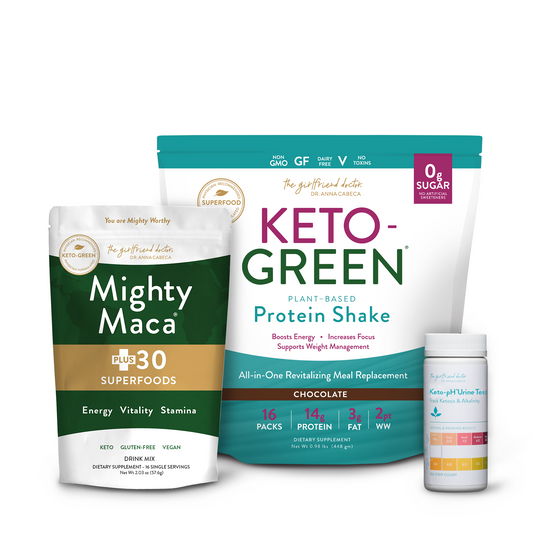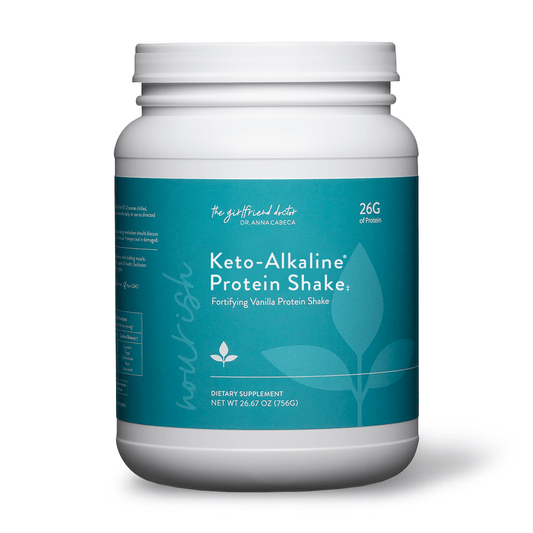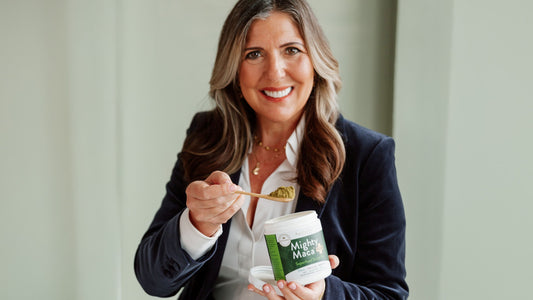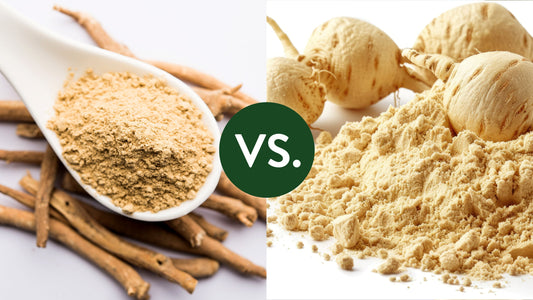Menopause can bring profound changes to your body, which you are probably well aware of. But did you know that with menopause comes an increased risk of developing or worsening autoimmune disease? As hormone levels fluctuate and estrogen declines, many women experience heightened inflammation and as a result, more frequent autoimmune flares. Some find themselves battling autoimmune issues for the first time in menopause.
This is one of the very important reasons we have to stay on top of our diet and lifestyle during perimenopause and menopause. Emphasizing daily movement, stress relief, and a diet rich in healthy fats, protein, and nutrient-rich vegetables, may offer a powerful way to support healthy levels of inflammation and regain balance.
In this article, I’m going to talk about:
Why menopause may trigger or worsen autoimmune flares.
The science behind how inflammation and autoimmune diseases are connected.
How a Keto-Green diet, rich in protein and vegetables, could help reduce inflammation.
Let’s dive into the connection between menopause and autoimmune disease to uncover how you can manage these challenges with greater ease.


As we well know, the menopause transition is characterized by a steep decline in progesterone and an erratic decline in estrogen. While these changes are a natural part of aging, they can have profound effects on the immune system, especially if you’re already living with autoimmune conditions.
Estrogen plays a crucial role in modulating immune responses, acting as both an anti-inflammatory agent and a regulator of immune cell activity. When estrogen levels drop, the immune system can become dysregulated, leading to increased inflammation and a higher likelihood of autoimmune flares. (1) This helps explain why conditions like rheumatoid arthritis, lupus, and Hashimoto’s thyroiditis could worsen during menopause.
Additionally, hormonal fluctuations can alter the balance of cytokines, the proteins responsible for signaling inflammation in the body. (2) An increase in pro-inflammatory cytokines during menopause could further contribute to joint pain, fatigue, and other debilitating symptoms common in autoimmune diseases.
The Role of Inflammation in Autoimmune Flares
Inflammation is a natural part of the body’s immune response, designed to protect against injury and infection. However, in autoimmune diseases, the immune system misfires, attacking healthy tissue and causing chronic inflammation. This persistent state of inflammation can lead to pain, swelling, and damage to vital organs.
During menopause, the decline in estrogen exacerbates this issue. Estrogen has anti-inflammatory properties that help regulate the immune system, and when its levels drop, the body becomes more prone to inflammatory responses. For women with autoimmune diseases, this creates a perfect storm — intensified symptoms, increased frequency of flares, and a more challenging path to symptom management.
The effects of inflammation extend beyond physical symptoms. Chronic inflammation has been linked to mental health challenges, such as heightened anxiety and depression, which are already more common during menopause. This dual burden can significantly impact your quality of life, making it essential to adopt strategies that directly target inflammation.
How A Ketogenic Diet Could Help
The keto diet has gained attention for its ability to reduce inflammation, balance blood sugar, and support overall health—benefits that are especially valuable for menopausal women managing autoimmune diseases. By emphasizing low-carbohydrate, moderate-protein, and high-fat foods, this diet shifts the body into a metabolic state called ketosis, where it burns fat for energy instead of glucose.
One of the key benefits of ketosis is the production of ketones, which have been shown to have anti-inflammatory effects. (3,4) For women experiencing autoimmune flares, this could translate to reduced joint pain, less swelling, and fewer overall menopausal symptoms. Additionally, a ketogenic diet helps stabilize blood sugar levels, which is critical for regulating the immune system and minimizing inflammatory spikes.
The inclusion of high-quality protein and non-starchy vegetables in a keto diet is equally important. I call this way of eating Keto-Green® and it’s vastly superior to a traditional ketogenic diet in every way — especially when it comes to menopause.
Here’s why the Keto-Green diet is so powerful: it includes protein to support muscle health and tissue repair, while vegetables provide essential vitamins, minerals, and antioxidants that combat oxidative stress. Healthy fats provide the essential building blocks for your body to synthesize hormones and power up your brain. Together, all of these components make the Keto-Green approach deeply nourishing for your body and mind.
Practical Tips For Managing Autoimmune Disease During Menopause
Successfully managing autoimmune disease during menopause requires a multifaceted approach that combines diet, stress management, exercise, and a personalized plan.
We work on bringing all of these components together in my Magic Menopause program. It’s an 8-week whole-health makeover that will leave you feeling happier, lighter, and in awe of your body instead of frustrated with it. Click here to join the waitlist!
Here are some practical tips to help you take control of your symptoms:


We’ve all been conditioned to start slashing entire food groups when we want to lose weight or start a diet.
Instead, start by thinking about what you can ADD to your daily intake. Throw some spinach or kale into your morning eggs. Drizzle your salads with some extra virgin olive oil. Replace your afternoon snack with a protein-fortified smoothie with berries and flax thrown in. I love using my Keto-Green Shake for this purpose.
The more you think about what you can add, the less restrictive your mindset becomes. And that leads to better success! Fill your plate with delicious foods like avocados, fatty fish, and leafy greens, and you’re halfway to winning the battle.
Then, work on avoiding highly processed or sugary foods that can exacerbate inflammation, insulin resistance, and menopause symptoms. You may just find the more you fuel your body with the *right* foods, the less you crave the junk.


Chronic stress can trigger autoimmune flares by increasing inflammation and hormonal imbalances. Try incorporating stress-relieving practices like yoga, meditation, or daily walks to help calm your immune system and improve overall well-being.
I realize this falls into the category of “easier said than done.” But, it’s crucial you try to get your stress under control. This is your one-and-only life after all, and feeling like a stress zombie is no way to live.


Menopause and autoimmune diseases are highly individualized experiences. Be honest with your doctor about your symptoms and how you’re feeling. If they brush you off, find another doctor.


Regular movement also helps reduce inflammation and boosts mood. There is no more powerful tool for supporting and improving your health than exercise. I know it can be extra challenging to work in your daily fitness routine when your body is working against itself, but if you can power through and squeeze in a simple walk, it really can help your mood, lower cortisol, and cool down inflammation.


If you aren’t already, try keeping a journal of your diet, exercise, and symptoms. This simple practice can help you identify patterns and triggers. This insight can help you make adjustments to your diet and lifestyle for optimal symptom management.
Final Thoughts: Menopause And Autoimmune Disease
As if you don’t have enough to deal with during menopause, waning sex hormones can exacerbate autoimmune challenges.
While this is a challenging side effect of the menopausal transition, it’s yet another reason to stay on top of your diet and lifestyle interventions.
You’ve got to be proactive when it comes to managing your hormones, insulin sensitivity, and your inflammation levels.
If you’re ready to start taking this crusade seriously, start by thinking about what you can ADD to your diet. Leaving behind an overly restrictive mindset is probably the best way to make permanent changes to your diet and by extension, your body.
My top pick? Try my perfectly balanced Keto-Green Shake for breakfast or an afternoon snack. You’ll love the blood-sugar-balancing benefits and the way it keeps you feeling full (with its 28 grams of protein for just 190 calories).
It’s such an easy way to start making the shifts you need to feel the way you deserve — happy, confident, and healthy!






